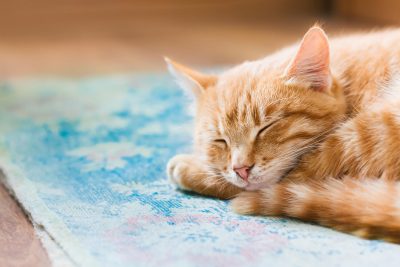
When you think about it, the pancreas is a lot like a cat: It typically goes about its business (of producing hormones and digestive enzymes) without a lot of fuss, but it definitely has a volatile and mysterious side that shows itself when the organ becomes inflamed.
The pancreas pulls double duty in the body. It produces hormones such as insulin and glucagon, which help maintain an appropriate level of glucose in the blood. But it also makes digestive enzymes that enable the body to use carbohydrates, fats and proteins for energy. That multitasking is all well and good, but it can cause confusion when a veterinarian is trying to diagnose a cat with pancreatitis.
Identifiying Pancreatitis
Pancreatitis is one of the most baffling diseases veterinarians see in cats. The signs of pancreatitis can be difficult to spot. Loss of appetite, lethargy, dehydration, weight loss, vomiting, abdominal pain and diarrhea can be symptoms of pancreatitis — and of many other illnesses. And some cats won’t present with any of thse symptoms: My own family cat, Varmie, had none of the typical signs of pancreatitis except for loss of appetite. Varmie’s case is a good example of why you should take your pet to the vet if you notice any changes in appetite, thirst, activity or elimination.
Another reason pancreatitis is such a puzzle is because we usually don’t know what causes it. In 90 percent of the cases we see, we don’t know why the pancreas has become inflamed. In cats, pancreatitis isn’t associated with obesity, high-fat foods, steroids or other drugs, as it is in dogs, but it can be linked with liver and/or inflammatory bowel disease. In addition, cats as young as 5 weeks and as old as 20 years can develop pancreatitis.
Solving the Mystery
As with any feline health problem, diagnosis begins with a medical history and a physical exam. Common signs we may see on examination of a cat who turns out to have pancreatitis are dehydration, low body temperature (or sometimes a fever) and icterus, a yellowish discoloration of the gums, whites of the eyes and ear tissue. We may also feel a mass in the abdomen, or note that the abdomen is painful when palpated.
Diagnostic tests don’t give us a definitive answer, but they can sometimes help. A blood test that measures what’s called pancreatic lipase immunoreactivity (fPLI) can give some useful answers, but results may not be available for a week or more.
An abdominal ultrasound may or may not indicate that the pancreas is inflamed, but certain findings are consistent with pancreatitis. On the other hand, some cats show no abnormalities on ultrasound but still have severe pancreatitis. One of the advantages of an ultrasound is that it may rule out or detect other diseases that cause similar symptoms.
A biopsy would let us know for sure that we were dealing with pancreatitis, but it’s a very bad idea to anger the pancreas. Poking and prodding at it to obtain a biopsy sample can trigger inflammation and make the condition much worse. Usually, our goal is to be as noninvasive as possible with both diagnosis and treatment.
Helping Cats Heal
Often, the best we can do is to start treating the cat’s symptoms while we wait for the results of the fPLI test. For instance, your veterinarian may prescribe anti-emetics if your cat is vomiting or pain-relief medication if the abdomen is tender. Antibiotics may be prescribed if your vet suspects that bacteria from the intestinal tract have traveled up the bile and pancreatic ducts to the pancreas, causing infection and inflammation. Cats who aren’t eating may need hospitalization for tube feeding.
Intravenous fluids are important, too. Giving fluids makes up for any fluid loss the cat may have experienced from vomiting, diarrhea or simply not drinking enough water. It also helps to improve blood flow through the pancreas.
If you’re lucky, your cat will have only a single acute bout of pancreatitis. Unfortunately, some cats develop chronic pancreatitis. That’s a low level of constant inflammation that can cause the cat to become deficient in digestive enzymes. Cats with chronic pancreatitis may need enzyme supplements to help them digest their food.
Pancreatitis isn’t easy to diagnose or treat, but it’s something your veterinarian may consider when nothing else seems to explain your cat’s illness.
More on Vetstreet.com:


 Schedule an Appointment
Schedule an Appointment
